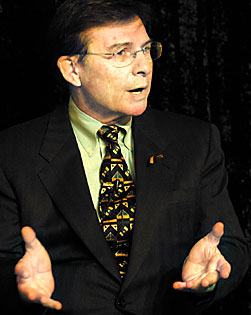 |
|
DAVID HARDEN/Arizona Daily Wildcat
|
President Pete Likins speaks to the press before his State of the University Address yesterday.
|
|
By Cyndy Cole
Arizona Daily Wildcat
Friday November 8, 2002
President Pete Likins made a case for raising in-state tuition by $1,100 and cutting programs to redirect funding at a noontime speech at the Marriott University Park yesterday, asking local movers and shakers to help him promote the Focused Excellence plan with their political power and their pocketbooks.
Community buy-in is vital to making Focused Excellence a reality, Likins told audience members.
Between recent budget cuts, little financial aid for needy students and a state Legislature that is spending less per student to support education than at any point since 1962, the UA's current budget situation is bad, Likins said.
"We've been firing people," he said. "We're going to be shutting down programs. We're going to severely diminish the quality of the work we do."
State funding has played a smaller and smaller role in the UA's budget, Likins said, falling from 45 percent of the budget in 1986 to 34 percent last year.
But the cuts haven't hit all sides of campus equally.
The programs that stand to lose the most because of the current budget situation are those that can't support themselves through research dollars and don't draw a lot of contributions ÷ arts, humanities and social sciences.
The UA draws about one-third of its budget from research grants.
The cutbacks in state funding have been coupled with stagnant low tuition rates, making Arizona's universities and the UA ranked as the least expensive of all U.S. senior public universities, Likins said.
"Folks, we must increase tuition," Likins told the attendees.
The crowd of about 600 applauded.
Likins said he wants to increase tuition by about $1,100 in-state and make other increases for non-resident students. It is unclear at this point whether Likins will pitch the whole $1,100 increase to the Arizona Board of Regents next spring for the 2003-2004 year, or parts of the increase.
Arizona families currently pay only about 4 percent to 5 percent of the UA's 15 percent revenues generated from tuition.
The tuition increase is only a small part of a plan to merge and delete some programs the administration dubbed Focused Excellence," which includes plans to prioritize programs based on the yet-to-be-defined term "diversity," cut growing enrollment and direct resources to programs considered to be "excellent."
Coupled with this plan is an idea about changing the mission of each of Arizona's public universities. The UA would keep programs deemed key, which include astrophysics, Earth sciences, biomedical science, borderland studies, environmental sustainability, indigenous peoples, optical sciences and water-related sciences, among others.
Deans and vice presidents are still working to identify which programs should be kept, Likins said. Likins will make more definite proposals to the regents about what should stay and what should go in January, he has said.
The proposed changes, and the regents' consideration of them, are a big step in the right direction in a university that has been ravaged by lack of funding Likins told audience members.
The budget situations and Focused Excellence composed the bulk of Likins' talk, but before most of the talk got underway, Likins and the audience paused in a moment of silence for the victims of last Monday's murders.
Eventually, the talk swung to how, between budget cuts and the murders of the three nursing professors, these had been trying times for Likins.
He read from a speech, which he has not done in a public forum for at least the past year, preferring usually to speak extemporaneously. This time, he said, he was concerned about using the wrong wording with the community.
Tucson developer Bill Estes Jr., who paid for a $1.5 million strength and conditioning center in the Eddie Lynch Athletics Pavilion, asked Likins how he planned to recruit more diverse students when K-12 schools aren't preparing students for the UA.
Likins said the UA would increase the minority population by competing more "aggressively" in terms of financial aid. He wants to focus on student retention.
"It's not just about more minorities in the freshman class. It's about more minorities graduating," he said.

